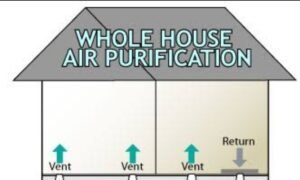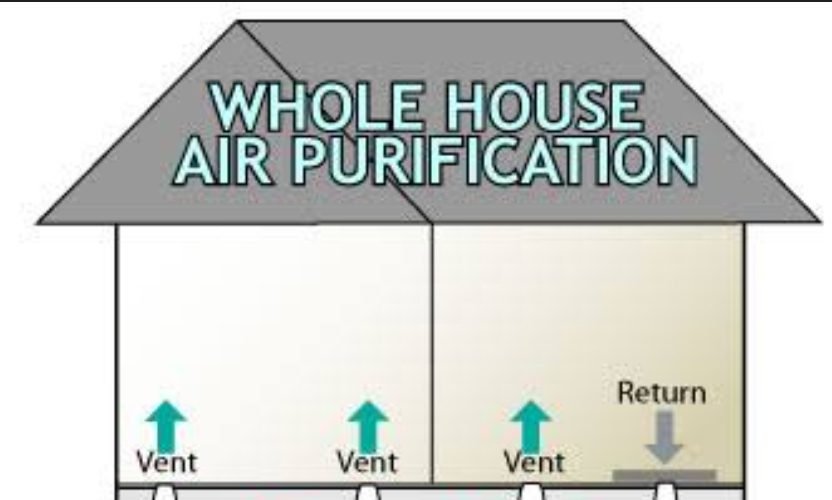Table of Contents
Enjoy cleaner and healthier air in your home. Discover the wonders of advanced filtration systems for purifying indoor air.
Indoor air quality significantly impacts our health and well-being, yet it’s often overlooked. With modern lifestyles spending a substantial amount of time indoors and ensuring clean and purified air becomes crucial.

indoor-air-Filtration-Systems
Filtration systems are instrumental in removing pollutants, allergens, and contaminants, contributing to a healthier indoor environment. Understanding these systems and their benefits can significantly enhance the air quality within our homes.
The Importance of Indoor Air Quality:
Indoor air quality (IAQ) plays a pivotal role in overall health. Poor IAQ can lead to various health issues such as allergies and respiratory problems, and even aggravate existing conditions like asthma. Common pollutants found indoors include:
- Dust and Allergens: Pet dander, pollen, dust mites, and other allergens can trigger allergies and respiratory discomfort.
- Volatile Organic Compounds (VOCs): Chemicals emitted by household products like paints, cleaning agents, and furniture can contribute to poor air quality.
- Mold and Bacteria: Dampness and moisture in indoor environments create conditions conducive to mold growth, leading to respiratory issues and allergies.
The Role of Filtration Systems:
Air filtration systems are a crucial component in maintaining healthy indoor air quality, and they often come integrated within HVAC systems. For instance, top-notch HVAC repair services in Draper prioritize the inclusion of advanced filtration systems in air conditioning units. These filtration systems work tirelessly to purify the air circulating within your space, trapping and eliminating a wide range of pollutants.
Moreover, regular maintenance and timely filter replacements by air conditioning professionals in Draper enhance the efficacy of these systems, ensuring you breathe easier and lead a healthier life indoors.
Filtration systems work to remove these contaminants, ensuring cleaner and healthier air. Several types of filtration systems are available:
- HEPA Filters: High-efficiency particulate Air (HEPA) filters are highly effective in capturing microscopic particles, including allergens, dust, pollen, and pet dander, providing exceptional air purification.
- Activated Carbon Filters: These filters excel at removing odors, smoke, and VOCs by adsorbing gases and chemicals onto their porous surfaces.
- UV-C Light Systems: Utilizing ultraviolet (UV) light, these systems neutralize and eliminate airborne pathogens, mold spores, and bacteria, enhancing air quality.
- Ionic Air Purifiers: These purifiers release negative ions that attach to airborne particles, causing them to fall to the ground, effectively removing them from the air.
Benefits of Filtration Systems:
- Improved Respiratory Health: By removing allergens, pollutants, and irritants, filtration systems help reduce the risk of respiratory issues and allergies, promoting better respiratory health.
- Allergen Reduction: HEPA filters and other systems significantly reduce allergens in the air, relieving allergy sufferers.
- Odor Elimination: Activated carbon filters effectively remove odors and volatile compounds, enhancing the overall freshness of indoor air.
- Reduced Spread of Illness: UV-C light systems and other germicidal technologies destroy airborne viruses and bacteria, reducing the risk of indoor illnesses.
Considerations When Choosing Filtration Systems:
- Room Size: Consider the room’s square footage to ensure the filtration system’s capacity matches the space for optimal efficiency.
- Type of Contaminants: Identify the pollutants or allergens you want to target to choose the most suitable filtration technology.
- Maintenance and Replacement: Regular maintenance, such as filter replacement or cleaning, is essential for the system’s effectiveness. Choose a system with accessible and affordable replacement parts.
- Noise Levels and Energy Consumption: Some filtration systems can produce noise, and certain types may consume more energy. Consider these factors for a system that aligns with your preferences.
Filtration systems are indispensable in creating a healthier indoor environment by removing pollutants, allergens, and contaminants from our air. Whether utilizing HEPA filters, activated carbon technology, UV-C light systems, or ionic purifiers, these systems play a crucial role in purifying indoor air quality.
Understanding the various filtration technologies, their benefits, and considerations for choosing the right system empowers homeowners to make informed decisions to improve their indoor air quality. By investing in effective filtration systems, individuals create cleaner, healthier living spaces, promoting overall well-being and respiratory health for themselves and their families.

